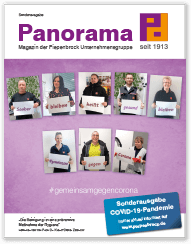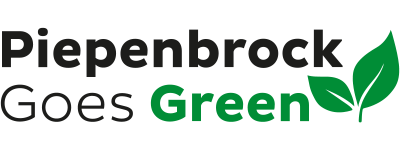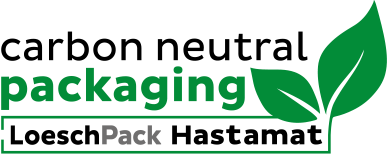

Global warming and rising sea levels, dwindling resources and an increasing number of endangered animal and plant species: our planet is undergoing a transformation and presenting our society with broad challenges. Climate and environmental protection are becoming increasingly important. Under the motto "Piepenbrock goes Green", we have defined company-wide environmental objectives and make an active contribution to environmental protection.
We are aware of the significance of environmental and climate protection. We therefore demonstrate our commitment to environmentally compatible entrepreneurial activity by designing our services and processes as environmentally friendly, deploying resources efficiently, reducing our emissions and promoting biological diversity.
Diversity in the ecosystems, in the world of animals and plants as well as within their species – all this describes biological diversity. It is a vital asset. It creates balance in nature and agriculture. We therefore see it as our task to protect and maintain biodiversity.

We have owned an area of forest in the Brandenburg nature park Stechlin-Ruppiner Land and conservation area Ruppiner Forest and Lake District since 1995. In the meantime, this comprises more than 2,200 hectares. This includes the 870 hectares of the Rheinsberger Rhin and Hellberge nature preserve as well as the fauna-flora habitat of the same name, which in turn is part of the European protected area network NATURA 2000. Moreover, our company-owned forest includes part of the Zechow hills.
With the forest, we make a contribution to environmental and nature protection. It provides food and habitat for a wide variety of animal and plant species – also including endangered, rare and historical species. In order to maintain the existing diversity there and promote further growth, we implement numerous projects in our forest.

Together with our customers, we have been planting trees in our forest in Rheinshagen since 2010 – for newly generated sales orders and order extensions. The respective customer receives a certificate for the trees planted on their behalf. In doing so, we not only assume responsibility for the environment, but also symbolise our long-term partnerships with our customers.

Over time, we have expanded the "Growth campaign". Alongside tree-planting campaigns in our forest, we plant additional trees directly at our customers' sites, as has already taken place in Dresden, at Münster/Osnabrück Airport or in Erfurt.

In order to preserve old and historical fruit varieties, we have established an open space in our forest where we have been planting rare varieties of fruit trees since 2010; these are usually older than 50 years. The oldest of these is even almost 1000 years old.
With our orchard, we are also helping wildlife. The trees provide nesting places for birds, protect animals in the treetops against predators and bad weather, and provide shade. In spring, the blossoms attract countless insects and the fallen fruit is a source of food for animals.
Over and above this, we have been planting the "Tree of the Year" in our forest every year since 2011. Each year it is nominated by the Dr. Silvius Wodarz Foundation and the board of trustees of the "Tree of the Year" in order to highlight the value of trees to society. With this campaign, we contribute to ensuring the continued existence of the various types of tree.

The apprentice project days have been taking place in our Piepenbrock forest every year since 2012. For three days, trainees and apprentices in cleaning and security services from our various branch offices find out more about our activities for environmental and nature protection. In the process, they get to know numerous properties of the species of animals and plants living in our forest and learn to appreciate the significance of the forest as an ecosystem. They also actively take part in environmental protection. In the past few years, for example, they have cleared heathland of shrubs and sprouting pine trees or built insect hotels to counteract the decline in insect populations and maintain the ecological balance.
Since 2013, the project days have been recognised every two years as an "Award-winning Project of the United Nations Decade on Biodiversity". The campaign of the United Nations honours projects focused in an exemplary way on maintaining ecological diversity. The project days were also given the "Regionally Committed" award by the association "Companies for the Region".

With our beehives – for example at the Piepenbrock Service Centre in Osnabrück and in the Hildesheim Magdalena Garden near the Caritas Magdalenenhof care home in Hildesheim – we make a contribution to maintaining the bee population and counteracting its decline. The number of bees has been declining for several years. The reasons for this are diverse, ranging from agricultural monoculture, pest infestation and diseases, all the way to a shortage of beekeepers. Bees, however, provide economic and ecological benefits. The insects are hugely important for the pollination of agricultural and fruit crops.
The bees from our beehives fly onto plants in the area, ensuring more diversity and higher yields. We give the honey produced by the bees to our customers and business partners as gifts.
For a positive CO2 balance

CO2 emissions are one of the major drivers of the climate change and the associated global warming that represent new challenges for our society. To counteract this and reduce the emissions we cause, we implement various measures.
CO2 report "First Climate"
We regularly create a CO2 balance for our Piepenbrock services – for the first time in the year 2010. Here, we work with "First Climate", one of the worldwide leading project developers and service providers for the issues of climate protection and water. The calculations are based on the internationally recognised Greenhouse Gas Protocol and ISO standard 14064. The factors that are taken into account come from scientifically recognised databases and are adapted in the event of new features. For the year 2018, our balance shows a positive development. We have been able to reduce our emissions compared to the previous year by approximately 8% – from 26,671 metric tonnes to 24,653 metric tonnes.
In addition to our own CO2 balance, we also contribute to the CO2 balance of the Federal Republic of Germany. The emissions reduced by our company forest are included in this balance.
Together with companies of different sizes and from different sectors, we have been supporting the project "Basic principles for a uniform emissions and climate strategy awareness in Germany". This was initiated by WWF Germany and CDP Germany. The project was also promoted by the National Climate Protection Initiative of the Federal Ministry for the Environment. Together with other people involved, we defined evaluation benchmarks to record emissions in a more uniform manner. The result was a set of instructions for companies to calculate emissions, making climate reports more comprehensible and comparable and providing readers with increased utility value.
The project is intended to contribute towards a reduction in greenhouse gases and to help achieve ambitious climate goals in Germany.
Numerous organisations and institutions from Osnabrück are involved in the advisory board 'Master Plan 100% Climate Protection'. There, the members collaborate in honorary roles and advise the city council on the subject of climate protection. We at Piepenbrock represent the seat of the "CCI Network Energy" in the advisory board.
The following objectives are to be achieved in the advisory board 'Master Plan 100% Climate Protection':

To ensure sustainable and energy-efficient management of the buildings in our group of companies, we have carried out numerous modernisations at various locations in the past. The implemented measures include:
We not only manage our own property and premises as increasingly energy-efficient, but also support our customers with our professional energy management. We advise them with respect to handling resources more efficiently. We indicate energy-saving potentials for our customers to reduce their energy consumption.

In order to reduce the CO2 emissions of our company fleet and ensure energy-efficient mobility, we regularly check the diesel and petrol consumption of our vehicles. We also hold recurring training courses to encourage a fuel-saving driving style.
Moreover, we are successively switching our vehicle fleet to optimised vehicle models. Here, the company orientates itself around the annual "VCD car environment list" of the ecological traffic club of Germany (Verkehrsclub Deutschland). In the year 2019, we replaced diesel vehicles with e-Smart ForFour vehicles for plant transport in Sindelfingen. We also transport our personnel and materials in Sindelfingen on Goupil G4 platform trucks and in Munich with Work StreetScooters made by StreetScooter GmbH. In the Landal Park Mont Royal on the Mosel, our employees travel on cargo bikes or in e-Berlingos made by Citroën. Our business managers also promote electromobility by driving BMW i3 vehicles.
Trees are felled worldwide for paper production. The tree plantations for timber production, however, are frequently environmentally damaging and contribute to virgin forest destruction.
Half of the paper consumption in Germany is attributable to printing, press and office products. In order to achieve a sustained reduction in our company-internal consumption, we have switched a large portion of our administrative processes to digital technologies and sensitised our employees to handling their resources more economically. For example, we have implemented the following measures:
The maintenance and operation of buildings in Germany account for a major portion of the total energy requirement and greenhouse gas emissions. This means that real estate is among the main causes of carbon dioxide emissions. We as facility management service providers are therefore called upon to develop innovative solution concepts together with our business partners and customers. This comprises the ecologically and economically expedient deployment of resources, the development of energy management systems, the implementation of waste and effluent management systems or the deployment of more environmentally-friendly cleaning techniques, processes and cleaning agents.

Innovations are the engine for developments, the improved quality of services and long-term company success. Our Technical Management, unique within our sector, is responsible for this. They take care of the continuous enhancement and optimisation of our services. The Piepenbrock Technology Centre occupies approximately 550 square metres. A wide variety of cleaning materials and machines can be tested there on different floor coverings. Over and above this, the employees in Technical Management handle large-scale and special orders and are involved in associations to define new industry standards as well as design the future of the cleaning services sector.
An important area of research covers methods of ecological and environmentally compatible cleaning. The deployment of cleaning agents, the application intervals as well as specific cleaning methods and techniques have negative effects on the environment. Our Technical Management checks our methods regularly. A selection of the measures we have implemented:

To determine how environmentally-friendly the cleaning services we provide for our customers are, we have developed our own instrument: 'ecological cleaning service'. A questionnaire is used to evaluate the services on site at the customer in nine different categories such as cleaning procedures, cleaning agents or dosing technology. In each category, we compare the actual status with the desired requirements for an ecological cleaning service and assign points accordingly. The higher the number of points, the more ecological is the cleaning in the respective customer premises. The result shows where there are still optimisation potentials to save resources, reduce CO2 emissions or protect the health of employees. Depending on the number of points scored, we award our customers an engraved tree disc with an inserted metal plaque in bronze, silver or gold.

As one of the efficient cleaning procedures in façade cleaning, we clean glass and window surfaces with osmosis. During the physical process of reverse osmosis, the minerals the water contains are filtered out before cleaning. The de-mineralised water is then pumped through a long telescopic rod to the cleaning implement and applied directly to the surface. There, it combines with the dirt particles. This enables us to use osmosis to clean façades at great heights without ladders or scaffolding. Moreover, unlike untreated water, no residue is left on the glass when the water from osmosis dries.

Our employees in industrial cleaning specialise in dry ice cleaning. With this method, the surface to be cleaned is blasted with cold CO2 pellets (at -78° Celsius) using compressed air. The impact and pin-point cooling ensure that unwanted coatings and layers are removed. The solid carbon dioxide (dry ice) is immediately converted into the gaseous state. Dry ice cleaning provides not only an optimal cleaning result with simultaneous cost efficiency. The process is also environmentally friendly. The pellets are colourless and odourless as well as climate neutral. No environmentally damaging additional chemical substances need to be added. The pellets are not produced artificially, rather are created as by-products of other industrial processes. Additional energy is not consumed. There is also no secondary waste such as waste water or sand, as would be the case for industrial cleaning with high-pressure water jets or sand-blasting.

It is not only the cleaning procedures that we design as environmentally-friendly, but also the deployed cleaning agents. Conventional cleaning agents in many cases contain chemicals that can only be broken down in nature to an inadequate degree and can also lead to environmental damage. Additional synthetic substances can also trigger problems such as skin irritations or allergic reactions among human beings. This is why our subsidiary Planol has placed a range of bio-degradable, colourless and odourless cleaning agents on the market: Ecoplan. These agents are produced on the basis of plant-based ingredients and are certified with the EU eco-label.
Production at Planol also takes place in line with safety and environmental standards certified in line with DIN EN ISO 9001. The products meet the criteria of the Federal Office for the Environment for the ecological compatibility of washing, cleaning and care products. This includes factors for the classification, marking, dosing, packaging and disposal as well as for the ingredients. For example, Planol takes part in the 'green point' in the dual system. The Planol product bottles and canisters are reused as secondary raw materials. For the associated savings of CO2 and crude oil equivalents, Planol has already been honoured repeatedly with the "Environment Certificate Green Point".

To reduce our CO2 emissions even further, to an increasing extent we use low-emissions working materials for our services at our customers on site. For example, we pursue an innovative transport concept in the Landal Park Mont Royal on the Mosel. Our employees travel in the extensive park on cargo bikes and electric cars. In doing so, we not only protect the environment, but also simultaneously reduce the noise impact for park guests.


30 years of sustainability management and "Piepenbrock Goes Green", 10 years of "Growth" campaign and sponsorship with Plan International Deutschland – our year 2020 is dominated by sustainability. We will be celebrating!
more
Sustainability plays an equally important role at Piepenbrock's affiliated companies LoeschPack and Hastamat. There, we summarise our ecological commitment under the motto "carbon-neutral packaging".
more